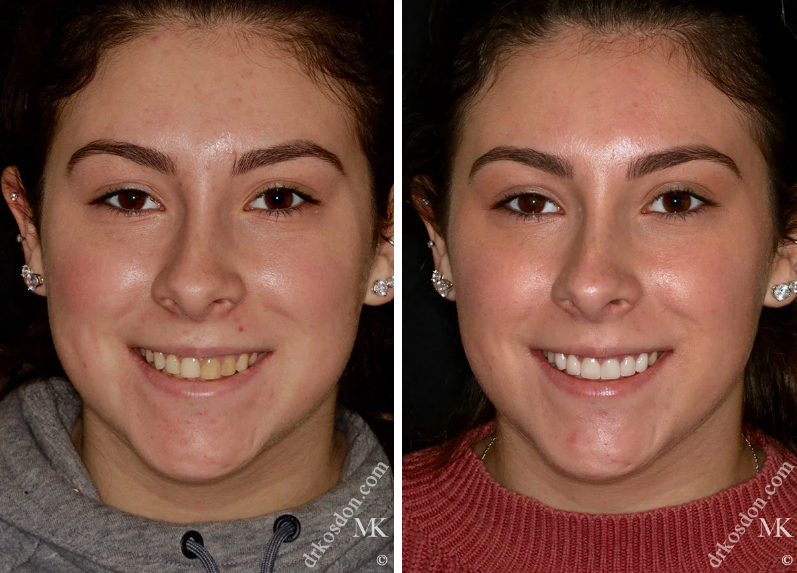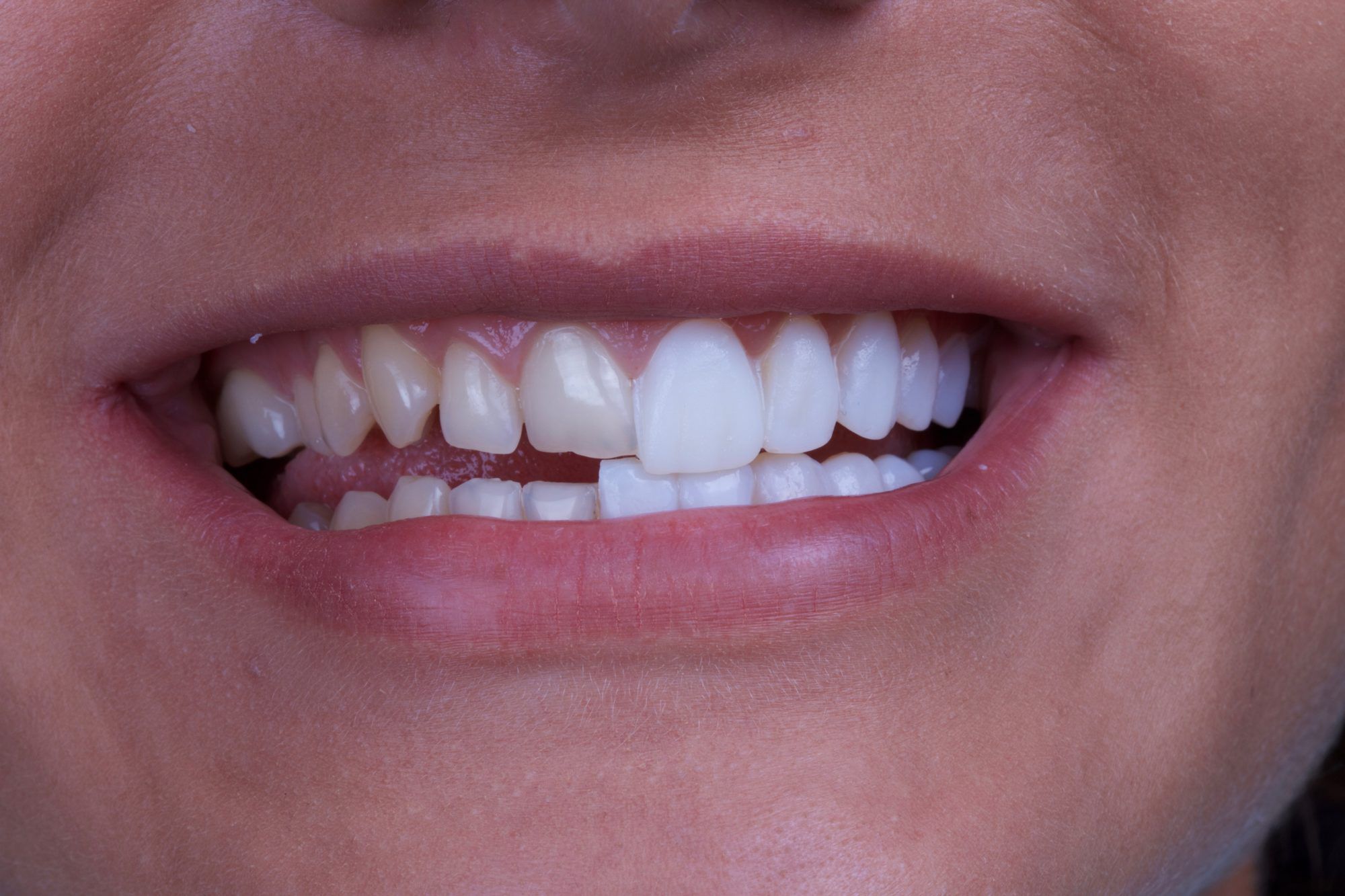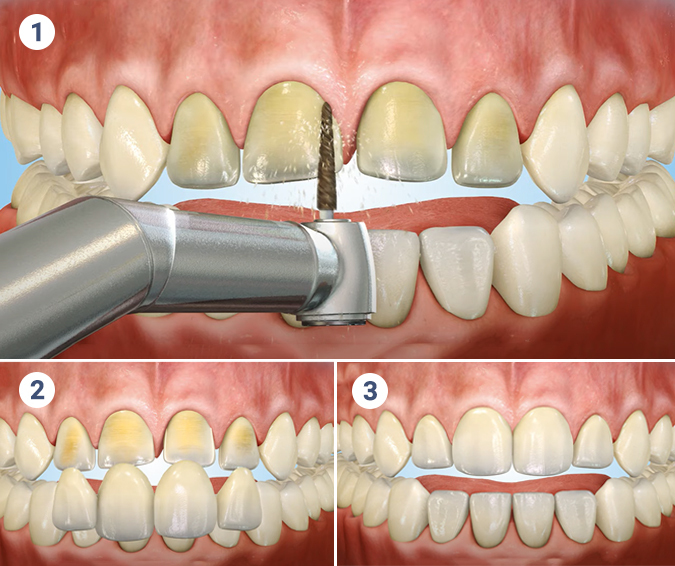Unlocking the Keys of Veneers: Truths, Kinds, and Benefits for a Beautiful Smile
Veneers use an engaging remedy for those seeking to improve their smiles. These dental enhancements can attend to numerous blemishes, from discoloration to misalignment. With options like porcelain and composite, individuals can choose based on their needs and preferences. Recognizing the subtleties of veneers, consisting of application and treatment, is crucial. What factors should one consider before choosing? The responses may shock those curious about this visual dental alternative.

Recognizing Veneers: What Are They?
Veneers are slim, customized shells created to cover the front surface area of teeth, enhancing their look. Typically crafted from long lasting products, these shells are customized to fit each person's teeth specifically. They offer several purposes, consisting of fixing visual blemishes such as discoloration, chips, or gaps. The application process includes a dental professional preparing the teeth, often by getting rid of a little amount of enamel to assure a snug fit. When prepared, the veneers are adhered to the teeth making use of a solid adhesive.
Clients frequently select veneers for their ability to produce a natural-looking smile while providing a durable option to dental flaws. Unlike other aesthetic dental care choices, veneers require very little invasive procedures, making them a preferred selection. The result is an improved smile that can greatly increase an individual's confidence and self-worth. On the whole, veneers provide an effective strategy to accomplishing a more appealing and harmonious dental look.
Kinds of Veneers: Porcelain vs. Composite
When taking into consideration cosmetic oral choices, 2 key sorts of veneers stand apart: porcelain and composite. Porcelain veneers are crafted from a durable ceramic product that simulates the natural look of teeth. They are known for their tarnish resistance and capability to mirror light similarly to all-natural enamel, giving a visual charm that many people need. The application procedure typically entails even more preparation of the tooth structure and might call for multiple brows through to the dental professional.
On the other hand, composite veneers are made from a tooth-colored resin that is directly related to the teeth. This kind allows for quicker application and can frequently be finished in a solitary browse through. While they are more economical than porcelain veneers, they might not provide the very same durability or resistance to discoloration. Eventually, the choice in between porcelain and composite veneers depends upon private preferences, budget, and particular dental needs.
The Advantages of Picking Veneers
Choosing veneers offers many advantages that can considerably boost both the appearances and performance of an individual's smile. Among the key benefits is their capability to remedy flaws such as discoloration, spaces, and misalignment, leading to a more uniform appearance. Veneers can also improve the longevity of teeth, supplying a protective layer that shields them from damages.
They need marginal tooth prep work compared to other oral procedures, preserving even more of the natural tooth framework. This preservation adds to a much healthier dental setting while still attaining a stunning smile.
Veneers are highly customizable, allowing people to select the form, dimension, and shade that finest suits their preferences. Furthermore, they are stain-resistant, making it simpler to maintain a brilliant and appealing smile gradually. Overall, veneers present a reliable alternative for those seeking both aesthetic improvement and lasting dental health benefits.
The Veneer Application Process
The veneer application procedure includes numerous essential steps to assure ideal results. An appointment is conducted to assess the individual's demands, followed by the preparation and shaping of the teeth. The veneers are bonded in place, with adjustments made for an excellent fit and appearance.
Preliminary Consultation Steps
An extensive preliminary appointment is necessary for any person considering veneers, as it sets the foundation for an effective therapy. During this meeting, the oral specialist assesses the individual's dental health and wellness, discussing any kind of existing problems that could affect the veneer application. This assessment might include X-rays and a visual examination to figure out the condition of the gums and teeth.
The dental practitioner likewise involves the client in a thorough conversation concerning their aesthetic goals, choices, and expectations. They might provide various veneer choices customized to the client's details needs. Furthermore, the specialist discusses the treatment, possible risks, and aftercare needs, guaranteeing that the person is comfy and well-informed before waging the therapy.
Preparation and Forming Teeth
After the initial examination, the next phase includes the preparation and shaping of the teeth to suit the veneers. This important action is executed by the dental expert, that carefully evaluates the tooth structure to figure out the quantity of enamel that requires to be removed. Normally, a slim layer, usually around 0.5 millimeters, is slashed off to ensure a correct suitable for the veneers. Precision is extremely important throughout this process, as it impacts both the overall comfort and the aesthetic outcome. Once the teeth are sufficiently formed, impacts are required to produce custom-made veneers that line up completely with the individual's dental profile. This precise preparation sets the phase for an effective veneer application, improving both appearance and function.
Bonding and Final Changes
Adhering to the shaping and prep work of the teeth, the bonding procedure begins, marking an essential stage in the veneer application. Throughout this stage, an oral adhesive is put on the prepared tooth surface area, assuring a strong bond in between the tooth and the veneer. The dental practitioner thoroughly places the veneer, making modifications to achieve the desired placement and appearances. As soon as appropriately put, a special light is used to heal the sticky, solidifying the bond. After healing, the dental expert conducts last modifications, trimming any kind of excess material and refining the veneer's form to guarantee a natural appearance. This mindful focus to detail improves both feature and visual appeals, contributing to an overall gorgeous smile that is durable and durable.
Caring for Your Veneers: Upkeep Tips
Caring for veneers is crucial to preserve their look and longevity. A regular daily cleansing routine, mindful evasion of staining foods, and routine dental examinations are vital elements of reliable upkeep. These methods aid assure that veneers stay in peak problem and remain to enhance one's smile.
Daily Cleansing Regimen
Frequently keeping veneers is important for their durability and look. A proper everyday cleansing routine can assist maintain their shine and stop damages. Dental professionals suggest cleaning twice a day with a soft-bristled toothbrush and fluoride toothpaste, making certain that all surfaces are cleaned up delicately to avoid scraping the veneer surface area. Flossing daily is additionally vital to eliminate food bits and plaque from in between teeth, where brushes may not get to. In addition, using an antimicrobial mouth wash can aid maintain oral hygiene without damaging the veneers. It is a good idea to stay clear of unpleasant cleansers and devices that can scrape the veneer. By adhering to these straightforward steps, individuals can keep their veneers looking gorgeous while promoting total dental wellness.
Staying Clear Of Discoloration Foods
Although veneers are designed to enhance the look of teeth, their susceptibility to staining necessitates careful nutritional selections. It is essential for individuals with veneers to be conscious of specific foods and beverages that can bring about discoloration. Dark-colored products such as coffee, merlot, and berry juices should be consumed in small amounts, as they are understood to discolor both natural teeth and veneers. Additionally, acidic foods like citrus fruits can deteriorate the bonding representatives made use of in veneers, making them more prone to discoloration. To preserve a bright smile, it is recommended to wash the mouth with water after eating staining foods and to exercise routine oral health. These thoughtful choices add significantly to the longevity and looks of veneers.

Normal Oral Exams

Preserving the stability of veneers needs a dedication to routine dental examinations, as these consultations play a crucial duty in guaranteeing their long life and look. Throughout these sees, oral specialists can analyze the problem of the veneers, looking for any type of indications of wear, damage, or underlying dental concerns. In addition, regular cleanings help remove plaque and tartar that can accumulate around the veneers, advertising general oral health. Dental professionals can also offer customized guidance on care techniques and items fit for veneer maintenance. By sticking to a routine of examinations, people can resolve prospective problems early, guaranteeing their smile stays vibrant and beautiful. Eventually, regular oral check outs are a crucial part of veneer care.
Is Veneers the Right Alternative for You?
Deciding whether veneers are the right alternative often rests on private oral requirements and aesthetic objectives. For those seeking to resolve problems such as discoloration, chips, or imbalance, veneers can provide a transformative option. Candidates normally include people with healthy and balanced teeth however want an enhanced smile.
Nevertheless, it is important to take right into account elements such as tooth enamel problem, the level of dental concerns, and the willingness to preserve veneers - Dental Veneers. Consulting with a dental expert is crucial, as they can assess oral wellness and determine if veneers appropriate
In addition, prospective prospects need to show on the lasting commitment, as veneers may need substitute every 10-15 years. Price factors to consider also play a considerable function, as veneers can be a substantial financial investment. Inevitably, the decision should be well-informed, balancing aesthetic wishes with useful considerations for enduring outcomes.
Often Asked Inquiries
How Much Time Do Veneers Commonly Last Prior To Requiring Substitute?
Veneers typically last between 10 to 15 years prior to requiring substitute. Aspects such as oral hygiene, lifestyle selections, and worldly top quality can affect their durability, making routine dental check-ups important for preserving their condition.
Are Veneers Safe for Individuals With Sensitive Teeth?
Veneers can be safe for individuals with delicate teeth, however it commonly relies on the intensity of sensitivity and the dental expert's method. Consulting a dental specialist prior to proceeding is necessary to guarantee excellent end results.
Can Veneers Be Eliminated or Replaced Conveniently?

Do Veneers Discoloration Over Time, and How Can I Prevent It?
Veneers can stain over time, specifically from foods and drinks like coffee or red a glass of wine. To avoid discoloration, keeping excellent dental hygiene, using a straw for drinks, and normal oral cleansings are suggested methods.
What Is the Cost Range for Obtaining Veneers?
The price of veneers typically varies from $500 to $2,500 per tooth, relying on variables such as product kind, dental professional experience, and location. Patients need to seek advice from oral professionals for personalized quotes and funding choices.
When the teeth are properly shaped, impacts are taken to produce custom veneers that straighten completely with the client's oral account. During this stage, a dental adhesive is used to the ready tooth surface, assuring a strong bond in between the tooth and the veneer. It is important to take right into account aspects such as tooth enamel condition, the degree of dental concerns, and the determination to keep What Are Veneers veneers. Veneers can be risk-free for people with sensitive teeth, yet it frequently depends on the seriousness of level of sensitivity and the dental professional's strategy. The expense of veneers generally varies from $500 to $2,500 per tooth, depending on elements such as product type, dental expert experience, and location.